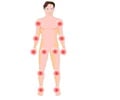Taking a daily dose of strontium ranelate can not only slow down osteoarthritis progression but can also reduce knee pain and joint damage and the need for surgery.

Strontium ranelate is an osteoporosis treatment proven to prevent vertebral and hip fractures. In non-clinical studies, strontium ranelate was shown to stimulate bone mass by slowing the breakdown of bone and stimulating new bone growth, having a positive effect on cartilage. Current OA treatments focus on improving disease symptoms through a combination of medication and non-pharmaceutical therapy, but there is currently no treatment approved to delay the progression of the disease. An international group of researchers recently evaluated if strontium ranelate was effective in reducing joint damage and symptoms caused by knee OA.
"Osteoarthritis is the most common disease in the elderly and there are currently major unmet medical needs in OA disease management," says Jean-Yves Reginster, MD, PhD, lead investigator in the study and president and chair, department of public health sciences at the University of Liège in Belgium. "There is currently no medication, approved by regulatory authorities to prevent the structural progression of the disease."
The Strontium Ranelate Knee Osteoarthritis Trial (also called SEKOIA) studied 1,683 participants with symptomatic primary knee OA over a three-year period. Participants were divided into three groups and randomly selected to receive strontium ranelate or placebo. Participants given strontium ranelate received one or two gram(s) daily dosage. Joint damage was evaluated yearly using digital X-rays. Also, using a computer assisted method, researchers measured knee joint space width, which correlates with cartilage loss. Researchers also evaluated symptoms such as pain, stiffness and changes in physical function using validated tools such as the WOMAC questionnaire.
Of the 1,683 participants, 82 percent (or 1,371) completed the study. Sixty-nine percent of the participants were female with average age 63 years-old, average body mass index (also called BMI) of 30±5 kg/m2, and average joint space width measuring 3.5 millimeters. Based on a test that measured disease progression, 60 percent of the patients had mild (stage two) and 40 percent moderate (stage three) knee OA.
Researchers noted that strontium ranelate was associated with a decrease in joint damage. After one year, cartilage loss in both groups assessed by the joint space width was -0.23±0.56 mm with 1g/day;-0.27±0.63 mm with 2g/day and -0.37±0.59 mm with placebo. The differences between treatment and placebo groups were 0.14 mm for 1g/day and 0.10 mm for 2g/day. Researchers also noted that strontium ranelate was effective in reducing pain and improving physical function. Overall, treatment with strontium ranelate was well tolerated, with no significant difference in adverse events between both treatment groups and placebo. Additionally, the safety of strontium ranelate was consistent with what was previously observed in osteoporosis.
Advertisement
Patients should talk to their rheumatologists to determine their best course of treatment.
Advertisement
Learn more about living well with rheumatic disease as well as rheumatologists and the role they play in health care. Also, discover the ACR''s Simple Tasks campaign, which highlights the severity of rheumatic diseases and the importance of early and appropriate referral to a rheumatologist.
Editor''s Notes: Jean-Yves Reginster, MD, PhD, will present this research during the ACR Annual Meeting at the Walter E. Washington Convention Center at 11:45 AM on Monday, November 12 in Hall E. Dr. Reginster will be available for media questions and briefing at 8:30 AM on Monday, November 12 in the on-site press conference room, Room 203 A-B.
Presentation Number: 1596
Strontium Ranelate in Knee Osteoarthritis Trial (SEKOIA): A Structural and Symptomatic Efficacy
Jean-Yves Reginster (University of Liège, Belgium)
R. Chapurlat (University of Liège, Belgium)
C. Christiansen (Center for Clinical and Basic Research, Ballerup, Denmark)
H. Genant (University of California San Francisco, San Francisco, Calif.)
N. Bellamy (The University of Queensland, Royal Brisbane and Women''s Hospital, Herston, Queensland, Australia)
W. Bensen, (St. Joseph''s Hospital McMaster University Hamilton, Ontario, Canada)
F. Navarro (Universitario Virgen Macarena. Servicio de ReumatologÃa Sevilla, Spain)
J. Badurski (Centre of Osteoporosis and Osteo- articular Diseases Bialystok, Poland)
E. Nasonov (State Institute of Rheumatology, the Russian Academy of Medical Sciences, Moscow, Russia)
PN. Sambrook (Royal North Shore Hospital Department of Rheumatology, St. Leonards, Australia)
T. Spector (Department of Twin Research & Genetic Epidemiology Kings College London, St. Thomas Campus London, United Kingdom)
C. Cooper. (Southampton General Hospital, Southampton, United Kingdom)
Background/Purpose: Treatments for osteoarthritis focus on improving symptoms through non-pharmacological and pharmacological approaches. Strontium ranelate (SrRan), a treatment for osteoporosis, was shown to stimulate cartilage matrix formation in vitro, and to reduce radiographic spinal OA progression in osteoporotic women with spinal OA. The objective of SEKOIA phase III study was to compare the efficacy of SrRan with placebo for reducing radiological progression of knee OA.
Methods: SEKOIA is a double-blind, placebo-controlled, randomized, 3-year study involving 1683 patients with symptomatic primary knee OA (Kellgren and Lawrence [KL] grade 2 or 3, joint space width [JSW] 2.5-5 mm) randomly allocated to SrRan 1 or 2g/day, or placebo. Primary endpoint was radiographic change in JSW of the medial tibiofemoral compartment from baseline to LOCF. Group comparisons were performed in the ITT using a general linear model with Dunnett''s multiple comparison procedure with baseline JSW, center and sex as covariates. JSW was measured yearly using a validated computer-assisted centralised reading method. Secondary endpoints included radiological progression (JSN≥0.5mm)1, radio-clinical progression (JSN≥0.5mm and WOMAC improvement≤20%)2, WOMAC scores, knee pain, and adverse events.
Results: The ITT set included 1371 (82%) patients. Age was 63±7 years, BMI was 30±5 kg/m2, JSW was 3.5±0.8 mm. 61% were KL II. 69% were female. SrRan was associated with less progression of cartilage degradation, decrease in JSW was -0.23±0.56 mm with 1g/day;-0.27±0.63 mm with 2g/day and -0.37±0.59 mm with placebo; estimated differences (SE) were 0.14(0.04),p<0.001 for 1g/day and 0.10(0.04),p=0.018 for 2g/day with no difference between doses. Results were confirmed in the Randomised Set and sensitivity analyses demonstrated minimal impact of missing post-baseline data.
Conclusion: SrRan 1 and 2g/day delayed radiographic progression of knee OA, evidencing a structure-modifying effect. This structural effect is translated clinically into a lower number of patients having a radiological progression over thresholds known to be predictive of OA-related surgery suggesting that SrRan could reduce the number of patients needing knee surgery in the long-term. The structural effect was accompanied by symptom improvement at the dose of 2g/day.
Disclosure:
C. Cooper. Consulting fees: Amgen, ABBH, Novartis, Pfizer, Merck Sharp and Dohme, Eli Lilly, Servier. J-Y. Reginster. Consulting fees or paid advisory boards: Servier, Novartis, Negma, Lilly, Wyeth, Amgen, GlaxoSmithKline, Roche, Merckle, Nycomed, NPS, Theramex, UCB. Lecture fees: Merck Sharp and Dohme, Lilly, Rottapharm, IBSA, Genevrier, Novartis, Servier, Roche, GlaxoSmithKline, Teijin, Teva, Ebewee Pharma, Zodiac, Analis, Theramex, Nycomed, Novo-Nordisk. Grant Support: Bristol Myers Squibb, Merck Sharp and Dohme, Rottapharm, Teva, Lilly, Novartis, Roche, GlaxoSmithKline, Amgen, Servier. R. Chapurlat. Research funding and/or honoraria: Merck, Amgen, Servier, Lilly, Roche, Novartis. C. Christiansen. Chairman of Nordic Bioscience A/S, Chairman of CCBR/Synarc. Consulting fees: Roche, Eli Lilly, Novartis, Novo Nordisk, Proctor and Gamble, Groupe Fournier, Besins EscoVesco, Merck Sharp and Dohme, Chiesi, Boehringer Mannheim, Pfizer, GlaxoSmithKline, Amgen. H. Genant. Consulting fee: Servier, Novartis, Pfizer, GSK, Roche, Genentech, Lilly, Amgen, Merck, ONO, Bristol Myers Squibb. Stock ownership in Synarc. N. Bellamy. Consulting fees: Servier. Registered copyright and trademark holder of the WOMAC® Index. W. Bensen. Research funding, consulting fees and/or honoraria: Abbott, Amgen, Bristol Myers Squibb, Janssen, Merck-Schering, Lilly, Novartis, Pfizer, Wyeth, Proctor and Gamble, Roche, Sanofi, Servier, Aventis, UCB, Warner Chilcott. F. Navarro. National coordinator fees: Servier. J. Badurski. Lecture fees: Servier, Amgen. E. Nasonov. Consulting fees, paid advisory boards, or lecture fees: Merck Sharp and Dohme, Rocher. X. Chevalier. Consulting fees or paid advisory boards: Expanscience, Negma, Genevriers, Merck Sharp and Dohme, Rottapharm, Fidia, Servier, Pierre Fabre, Smith Nephews. Lecture fees: Merck Sharp and Dohme, Servier, Expanscience, Ibsa, Genzyme. Grant Support: Roche for the department association. P. Sambrook. National coordinator fees: Servier . T. Spector: National Coordinator Fees Servier. Research funding - Pfizer, consulting fees Expanscience, Ono Pharma.
Please visit www.rheumatology.org to view the full abstract
Source-Newswise















